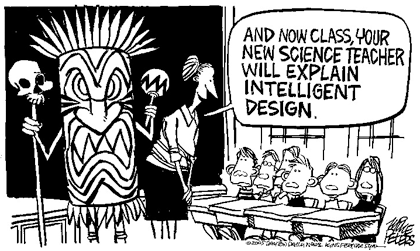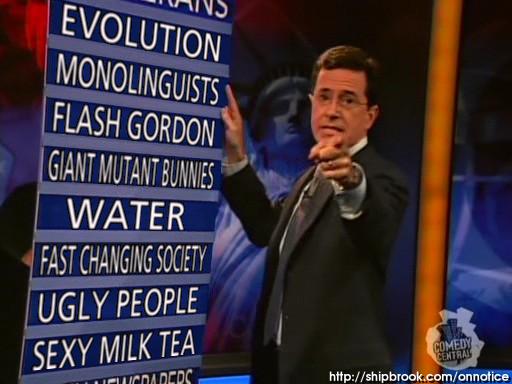 During a Republican presidential debate in May, Mike Huckabee raised his hand when asked by the moderator which candidates did not believe in evolution. Huckabee's been deflecting flak about that hand-raise ever since. Most recently, Huckabee appeared on Real Time with Bill Maher, where Maher asked him about evolution. As he had several times since the May debate, Huckabee seemed to back-pedal, and to embrace a form of theistic evolution. Besides, Huckabee said, the question was "utterly silly," since he was running for president and not for eighth-grade science teacher (he's made this claim before). However, unlike Wolf Blitzer during a June debate, Maher called Huckabee on this:
During a Republican presidential debate in May, Mike Huckabee raised his hand when asked by the moderator which candidates did not believe in evolution. Huckabee's been deflecting flak about that hand-raise ever since. Most recently, Huckabee appeared on Real Time with Bill Maher, where Maher asked him about evolution. As he had several times since the May debate, Huckabee seemed to back-pedal, and to embrace a form of theistic evolution. Besides, Huckabee said, the question was "utterly silly," since he was running for president and not for eighth-grade science teacher (he's made this claim before). However, unlike Wolf Blitzer during a June debate, Maher called Huckabee on this:Why shouldn't it be part of a political discussion? If someone believes that the earth is 6000 years old, when every scientist in the world tells us it's billions of years old, why shouldn't I take that into account when I'm assessing the rationality of someone I'm going to put into the highest office in the land?Huckabee had no cogent answer; he said that the point was that "we don't know."
Why not give Huckabee the benefit of the doubt? Perhaps he really does believe in theistic evolution--the idea that evolution occurred, but that it is controlled by God. As Max Brantley of the Arkansas Times likes to point out, Huckabee is adept at running from his record. He's distanced himself from reasonable tax increases he supported as governor, and disowned the one or two good programs that he ought to be claiming. Why should anyone believe that his recent open-mindedness about evolution is anything but pandering to the moderates who may see Huckabee as an alternative to the less-than-inspiring Republican front-runners? Note that Huckabee made his concessions on the Bill Maher show, and on New Hampshire Public Radio. He's not exactly going to offend the conservative Republican base in either of those arenas.
No, much like Sam Brownback, Huckabee has realized--or had someone point out to him--that sane, educated people don't doubt the theory of evolution. Even though he's denied it throughout his career, at least allowing for the possibility of evolution might make him appear reasonable enough to be palatable to thinking Republicans. There will be plenty of time to insert creationism into school curricula after he's president. Don't think he would? How about this quote:
I think that the state ought to give students exposure to all points of view. And I would hope that that would be all points of view and not only evolution. I think that they also should be given exposure to the theories not only of evolution but to the basis of those who believe in creationism …Why in heaven's name should we believe that Huckabee has changed his ideas on creationism? (You can read more about Huckabee's record on teaching creationism in the schools in an excellent Arkansas Times article here.)






